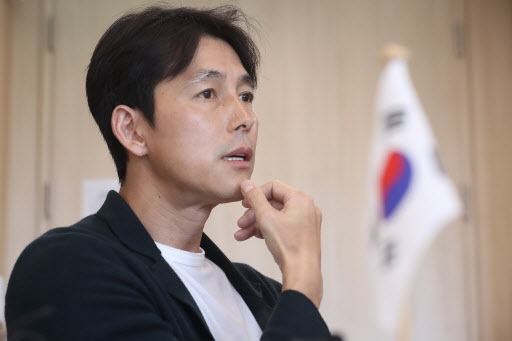Actor Jung Woo-sung, a goodwill ambassador for the UN Refugee Agency, on Tuesday stressed the need for South Korea to support the Rohingya Muslims fleeing violence in Myanmar after his second visit to the world’s largest refugee camp.
“The refugee issue is not only their problem, it is our problem,” Jung told a group of reporters during an interview held at the office of the UNHCR in central Seoul. “When I say ‘we,’ it could be taken as a limited meaning, but it is a problem (for all) of humanity and we belong to it.”
 |
UNHCR goodwill ambassador Jung Woo-sung speaks to reporters at the UNHCR office in Seoul on Tuesday. Yonhap |
Jung, who has been a UNHCR honorary ambassador since 2014, visited the Kutupalong refugee camp in Bangladesh from May 19-23.
An estimated 910,000 Rohingya refugees have fled Rakhine state in northern Myanmar and now live outside Myanmar. About 55 percent are under the age of 17.
The Rohingya are denied citizenship by Myanmar, a predominantly Buddhist country that sees them as illegal immigrants from Bangladesh. This has led to the world’s fastest-growing refugee crisis.
“In other refugee camps, they had hope that they could go back home. But Rohingya refugees had doubts about whether they could go back to the land (where) they feel at home. They are the ones who are in the most devastating and appalling situations,” Jung said.
What frustrates Rohingya refugees the most is the lack of access to education for their children, he said.
Acknowledging that a political solution is needed to end the ongoing crisis, Jung said the burden should not lie solely on the Bangladeshi government.
“Economically developed countries in Asia, such as South Korea, should more proactively perceive (the problem), sympathize and continue to give support,” he said. “We cannot leave Bangladesh, Myanmar and Rohingya Muslims with the burden of finding a solution.”
Jung also stressed the role of Koreans and the Korean government.
Recalling how South Korea rose from the ashes of the 1950-53 Korean War with the help of the international community, Jung said, “I think we, who are living in the contemporary world, should take more interest in the refugee issue.”
He also expressed concerns about the hateful anti-refugee sentiment that exists within Korean society, as well as the government’s proposal to toughen the Refugee Act.
“We are giving temporary opportunities for them to stand on their own feet while protecting their dignity because they are people who are in difficulty,” he said. “Toughening the act would be about controlling, alienating and managing refugees, which is far from the purpose of the act.”
After all, every refugee is an individual who dreams of the lives all Koreans dream of, he said.
As a goodwill ambassador for the UNHCR, Jung has visited refugee camps in Nepal, South Sudan, Lebanon, Iraq, Bangladesh, Djibouti, Malaysia and Bangladesh. His book, “If You Could See What I Have Seen,” based on his five years with the refugee agency, is set to be published next month.
By Ock Hyun-ju (
laeticia.ock@heraldcorp.com)








